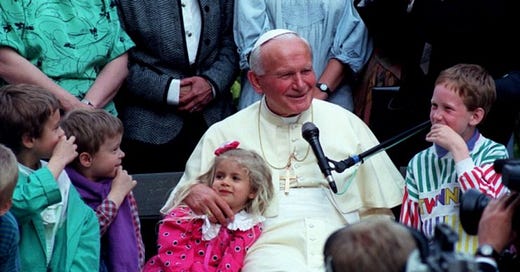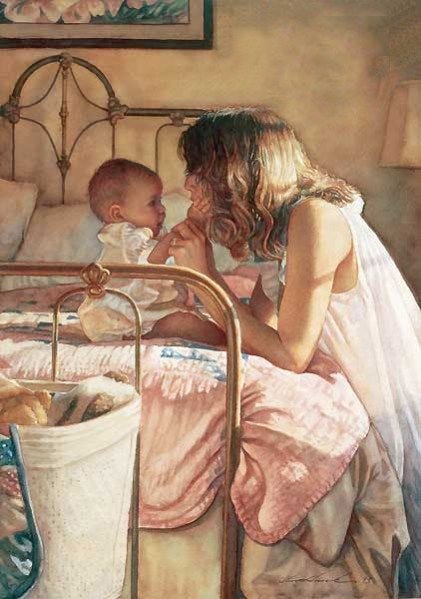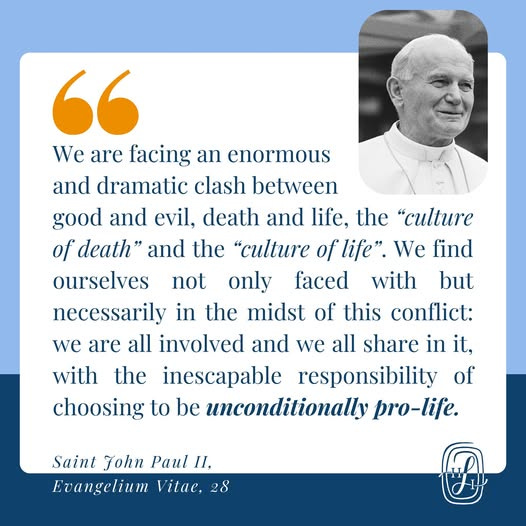I look around at my home— it is once again a mess. And no, not just one room. Somehow, despite the careful tidying done only a few hours before, every room is now littered with toys. The kitchen counters are covered in random things, even though they were previously clear. Let’s not even talk about the basement, where the toddler decided that spreading the clean laundry out was more entertaining than playing with his many toys.
Do I wish that I could put an elegant tablecloth on our dining room table and complete the look with a bouquet of fresh flowers? Yes, yes, I do. Do I wish that our lovely character home, with its cottage-core potential, could be furnished with unique furniture instead of randomly colored kid-friendly bookshelves and play structures? Yes, yes, I do.
Am I happy?
Even though I don’t get what I want?
Yes, astoundingly, yes.
“I actually don’t know anyone who is like, happy and has children at this age,” said Roan, 27, adding, “I have literally not met anyone who is happy, anyone who has light in their eyes, anyone who has slept.”
This quote has appeared all over the internet. In a candid interview, a singer named Chappell Roan (honestly, I had never heard of her before this) bequeathed these words upon the world.
It hit a nerve.
Why? Because her narrative presents the hypothesis that happiness and parenting small children don’t go together.
We shouldn’t be surprised. Having children is counter-cultural these days. Just look at the birth rate in all first-world countries.
Having children and enjoying it? Well, that is just crazy!
Secular Western culture, in the wake of third-wave feminism and the continuing technological revolution, holds productivity and convenience as the ultimate goals of life. This includes being free of responsibility as much as possible so you can live your full potential doing whatever the heck you want.
Not mincing his words, St. Pope John Paul the Great calls this approach to life “the culture of death.”1 In his Apostolic Letter Evangelium Vitae, he writes extensively on how abortion, euthanasia and a general disdain for children are a result of a culture that holds up independence and a false sense of freedom based on being able to follow one’s whims and passions without constraint. Those who are dependent are seen as weak, not contributing to society.
This attitude has skewed our view of children. People complain and generally have a negative view of their parenting experiences. They joke about being “one and done.” They look utterly shocked when I say that my husband and I do not have a specific number of kids in mind, but a minimum of five sounds good. It is radical to want children.
Chappell Roan sees her friends with children as unhappy.
They can’t do whatever they want, and they aren’t getting sleep.
And on some level, it is true. Having children does not make you happy.
Not having children also does not make you happy.
Getting sleep does not make you happy. I know lots of people who get way more sleep than me and they still aren’t happy.
Sensing a pattern?
Venerable Fulton Sheen puts it this way: "You will never be happy if your happiness depends on getting solely what you want. Change the focus. Get a new center. Will what God wills, and your joy no man shall take from you".2
Happiness, when it is based solely on getting what you want, is indeed hard to find. So many circumstances are beyond our control, and so if you base your happiness on things that change, it will always evade you. If you think that having no responsibilities will make you happy, then yes, having children will throw a wrench in your happiness plans.
My twelve-year-old brother (the youngest of eight) remarked during a meal where my two-year-old was yelling and throwing food, “How long does it take to get used to this?”
Well, honestly…. I will probably never fully get used to being constantly disturbed by macaroni being thrown at me. But, that’s not really the point.
The point is that I value what my feral cherub children bring to my life more than I value having a peaceful dinner time.
The book Hannah’s Children is making its rounds in a lot of circles. I’ve written about it before. Amongst many other things, it discusses how families decide to have children (and lots of them.) At the heart of it is a discussion of values and how we measure what matters to us the most.
One of the mothers’ interviews for the book says this:
“suppose it boils down to some sort of deeply held thing, possibly from childhood—a platinum conviction—that the capacity to conceive children, to receive them into my arms, to take them home, to dwell with them in love, to sacrifice for them as they grow, and to delight in them as the Lord delights in us, that that thing, call it motherhood, call it childbearing, that that thing is the most worthwhile thing in the world—the most perfect thing I am capable of doing.”
Parenting is difficult work. It requires sacrifice on many levels. It costs your time, your energy, and at times, your sanity.
However, in my experience, it also brings the greatest love and joy that I have ever experienced. When my little boy reaches up to me and says with his sweet voice, “hold me, Mama,” the scale in my heart forever tips towards embracing my life as a parent, making the sleepless nights insignificant. Waking up inches from my angelic baby’s face is of far more value to me than going away to a week-long pottery camp.
I firmly believe that the best way we can stand against the culture of death is to have children, and do so joyfully. It is one thing to give birth to children, but it is another to be exceedingly happy about it. Yes, we all have our hard days as parents, but if our overall attitude towards children is one of joy and peace, people will notice. Step aside gentle parenting, joyful parenting is in! Our happiness is based on willing what God wills; abundant life.
Even if you are not a parent, you can still join in the revelry. Find ways to support the families in your life. No parent I know would turn down the offer of a meal, an hour of childcare or help with dishes. Maybe get involved with children in some capacity at your Church (yes, guys can take these suggestions too.) Show the world that you value children by your actions.
Join the cause of contradicting anti-life views by living out the belief that children are a gift.
Things I’ve enjoyed lately:
This article by
on hair styles. A good encouragement to take our femininity seriously!- self-published a medical thriller called Remembrance. I thoroughly enjoyed it; here’s the synopsis to get you hooked!
“After a psychotic break lands Leah Harvey in a clinical trial for an experimental new treatment, she assumes that things are looking up. But when she's t-boned on her way to an appointment and ends up missing her monthly check-in, her symptoms come out of remission and flare up with a vengeance. At first, she chalks it up to residual effects of the accident, or to missing her treatment, but she's quickly drawn into a complex network of secrets threatening to burst. Not only is her view of her condition changed forever, but her understanding of her very self.”
My friend Danielle Savard just started The Spiritual Warfare Podcast, and I firmly believe you all need to listen to it!
“Inspired by The Spiritual Exercises of St. Ignatius and based on the theme of Ephesians 6, the mission of the warfare podcast is to educate and equip listeners with practical discernment tools to hear God's voice and make God-inspired decisions.”
I’ve been so excited to make these cinnamon buns for Easter morning. I like to add bananas to the middle part for extra goodness!
My talented brother released a thoughtful (and moody) folk song called The Ballad of the Boxer! Listen here
Have a blessed first week of Easter!
Peace,
Hannah Chartier
Evangelium Vitae: "Walk as children of light ... and try to learn what is pleasing to the Lord. Take no part in the unfruitful works of darkness" (Eph 5:8, 10-11). In our present social context, marked by a dramatic struggle between the "culture of life" and the "culture of death", there is need to develop a deep critical sense, capable of discerning true values and authentic needs.
What is urgently called for is a general mobilization of consciences and a united ethical effort to activate a great campaign in support of life. All together, we must build a new culture of life: new, because it will be able to confront and solve today's unprecedented problems affecting human life; new, because it will be adopted with deeper and more dynamic conviction by all Christians; new, because it will be capable of bringing about a serious and courageous cultural dialogue among all parties. While the urgent need for such a cultural transformation is linked to the present historical situation, it is also rooted in the Church's mission of evangelization. The purpose of the Gospel, in fact, is "to transform humanity from within and to make it new".123 Like the yeast which leavens the whole measure of dough (cf. Mt 13:33), the Gospel is meant to permeate all cultures and give them life from within, 124 so that they may express the full truth about the human person and about human life.
Fulton J. Sheen, "Ye Shall Know The Truth"






